WASHINGTON, DC — Barely a third of Americans know that physical activity reduces the risk of cancer, according to a new AICR survey that shows many Americans remain unaware that diet, activity, and weight play a role in their cancer risk.
The online survey commissioned by AICR reveals that too many Americans still cling to the myth that they are powerless to prevent cancer. The survey was released on World Cancer Day and in Cancer Prevention month, occasions that work at dispelling cancer myths and improving general knowledge.
“This tells us there are millions of Americans who don’t yet have the information they need. Who are ready to hear the empowering message that they can take steps to protect themselves – they just haven’t heard it yet,” aid AICR’s Associate Director for Nutrition Programs Alice Bender, MS RDN.
The AICR Cancer Risk Awareness Survey asked respondents to agree or disagree with several statements about cancer risk, including:
- People can’t do anything to change their risk of getting cancer.
Over one in six Americans agreed with this cancer myth (17%) and another 24% could not decide whether to agree or disagree. - Diet affects people’s risk of getting cancer.
Just over half of Americans (58%) knew that they can indeed cut cancer risk with a healthy diet, but far too many either disagreed (11%) or could not make up their minds (31%). - Body weight affects people’s risk of getting cancer.
Awareness of this link is alarmingly low: less that half (41%) of those surveyed knew that body weight has an impact on cancer risk. One in 5 (20%) disagreed, while a whopping 38% could not make up their mind. - How active someone is affects their risk of getting cancer.
Of the three steps to lower cancer risk, awareness of physical activity’s protective power was lowest, with only 39% of Americans understanding its role. Almost 1 in 4 Americans (23%) disagreed, while another 39% neither agreed nor disagreed. - Getting less processed meat (e.g. bacon and salami) reduces the risk of someone getting cancer. Processed meat is a cause of colorectal cancer, yet fewer than half (44%) of Americans are aware there is a link to processed meat and cancer.
- Whether or not someone gets cancer is mainly due to their genes or family history.
Approximately one in five Americans (21%) know that genes and family history is not the main cause of developing cancer.

Survey: Risk
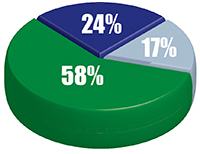 People can’t do anything to change their risk of getting cancer.
People can’t do anything to change their risk of getting cancer.
Survey: Diet
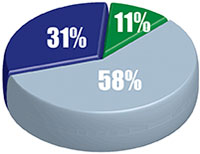 Diet affects people’s risk of getting cancer.
Diet affects people’s risk of getting cancer.
Survey: Weight
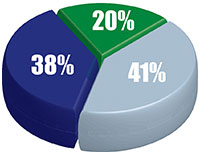 Body weight affects people’s risk of getting cancer.
Body weight affects people’s risk of getting cancer.
Survey: Activity
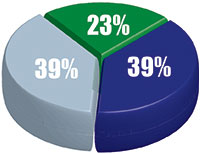 How active someone is affects their risk of getting cancer.
How active someone is affects their risk of getting cancer.
Survey: Meat
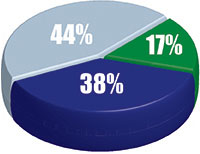 Getting less processed meat (e.g. bacon and salami) reduces the risk of someone getting cancer.
Getting less processed meat (e.g. bacon and salami) reduces the risk of someone getting cancer.
Survey: Genes
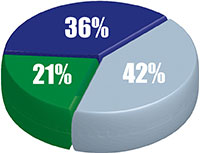 Whether or not someone gets cancer is mainly due to their genes or family history.
Whether or not someone gets cancer is mainly due to their genes or family history.
“The research shows that we can do something about cancer risk, but first we have to make those healthy choices. That’s the message that the public needs to hear: DO SOMETHING,” said Bender.
Updated AICR preventability figures estimate that approximately 374,000 cancers in the United States per year could be prevented by Americans making changes to our diet, weight and physical activity. That figure represents approximately one-third of the most common US cancers.
NOTE: Results from YouGov online AICR survey of 1,233 US adults conducted between Dec 13-16, 2013. Results are weighted and are representative of all US adults (+18 years old) Raw data is available by contacting [email protected].





